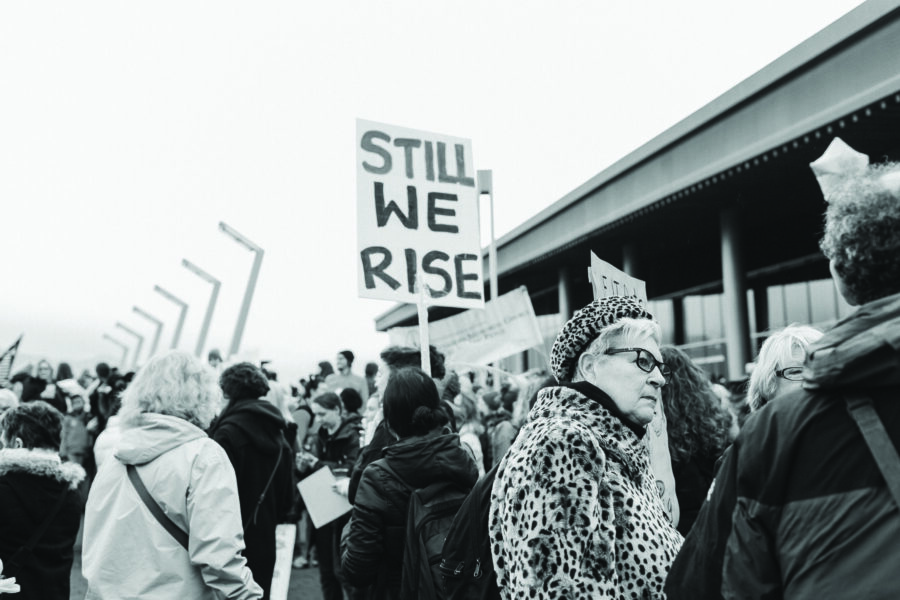
10 Reasons to Be a Feminist
- Amanda Pereira
- 07 Jul 2017
1. The Pay Gap
According to StatsCan, full-time employed women earn only $0.74 for every dollar a full-time employed man makes. Adjusted for hours worked, women still only earn $0.87 for every male dollar. This devalues women’s work, making women more likely to drop out of the workforce and have longer-term issues saving for retirement.
2. Sexual Harassment
Enjoying a media moment due to the trial of Jian Ghomeshi, sexual harassment in the workplace is still a huge issue: an Angus Reid poll in 2014 found that 28% of people who responded claimed they did not report sexual harassment at work, owing in part, to fear of losing their jobs. When broken down into gender, women were four times more likely than men to be the ones harassed.
3. Speaking Up, But Not Being Heard
A Harvard study in 2015 found that when women collaborated with male colleagues, they were less likely to see returns for their work, though the men were almost 4 times more likely to see promotion than when they worked by themselves. The Journal of Language and Social Psychology published a study noting that women were more likely to be interrupted, by both men and women, than men were.
4. Inadequate Family Planning Tools
Though the UN recognizes that access to family planning that is safe and affordable is a basic human right, our culture hasn’t caught up yet. Resources to help plan and raise families are still hard to come by and women end up bearing the brunt of that work, and those affected the most are women in lower income brackets.
5. Unpaid Labour in the Workplace
Women are more likely than their male colleagues to be asked to do unpaid work around the office, like getting coffee, organizing the birthday cards and cleaning up after office meetings.
6. Less Hirable, or When do You Plan on Having a Baby?
͟Though Canada has policies on the books to prohibit hiring discrimination based on pregnancy, a study in the UK found that 40% of managers were less likely to hire young women because of the risk of pregnancy. Canada and Ontario both bar discrimination based on pregnancy, but what happens when managers opt to discriminate on women based on their potential to get pregnant? This is still discrimination, though harder to pin down and women face the uphill climb to prove this.
7. Less Hirable, or John’s More Qualified Than Jane!
͟In a Yale University study, researchers found that scientists were more likely to find a woman candidate less qualified than a man, even where their resumes were the same (it is also worth noting that when the woman was chosen, those scientists offered her less for the same job than they did to the male candidate). Our culture still has a perception that women are somehow less qualified than men solely based on the fact that they are women, leading to worse outcomes for female employment.
8. Girls Pushed Out of STEM
Women represent just 22% of workers in STEM fields, where the pay gap is about 7 cents, according to StatsCan. Given how lucrative careers in STEM can be, that’s a huge failing, and studies have found women quit STEM due to sexual harassment, being looked over for promotion as a rule, and a workplace culture that promotes sexism.
9. Tampon Taxes and Other Period-Related Things
A recent tweet went viral after pointing out that it was common in the tech industry to see firms that supplied free beer for their employees but still required female employees to pay for their tampons. The problem with this is not only that tampons are too often treated as a luxury good (where they can be taxed, or not supplied at all) but that an omission like this smacks of a culture where men are the center, presumed employees leaving women in an “othered” position where they need to conform to men, as opposed to just doing their jobs.
10. Office Dress Codes
Though Ontario and British Columbia have both taken steps to eradicate heel dress codes that only affect women in the workplace, the rest of Canada is still alright with forcing female employees to dress a certain way. Further, those bills are focused on sexualized clothing in mostly restaurants and bars. The implied requirement that women in other professions remain similarly dressed, skirts and heels, is going largely unnoticed.
Comments 0
There are no comments

Add comment